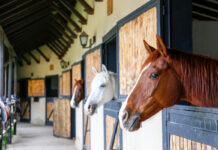
Edited Press Release
1. More Calories: People joke about “bulking up for winter,” but for horses that live outside, increasing calories is a very real need because it takes more calories to keep warm. High-quality hay is the foundation of any healthy diet, and boosting calories through an increase of the hay ration is a healthier option than increasing the grain ration. Older horses that are unable to consume their calories from hay due to dental disease might need another calorie source, such as corn oil. Horse owners should consult with a veterinarian about dietary management during the cold winter months.
2. Water, Not Ice: Horses need abundant, fresh water, even when it is cold outside. Owners should check several times daily to make sure that the water source is not frozen. There are numerous types of heating units, made specifically for this purpose, to ensure that your horse has fresh, unfrozen water available at all times.
3. Fresh Air: Keeping your horse in a warm, tightly shut barn is not necessarily a good thing. A closed-up barn increases your horse’s exposure to airborne dust and allergens. A well-ventilated barn, even if it means a drop of a few degrees in temperature, will keep the air fresher and healthier for your horse. If your horse has a non-infectious respiratory disease such as Recurrent Airway Obstruction (“Heaves”) or Inflammatory Airway Disease, it is particularly unhealthy for the horse to be inside the barn since exposure to high levels of particles in the air can trigger a flare-up of respiratory signs. Invest in a warm, weatherproof blanket and leave a horse with airway disease turned out, with access to a run-in shed for shelter.
4. Check Under Blankets: Some horses that live outside year-round have their blanket on all winter. While blanketing may be necessary to keep your horse warm, it can sometimes hide things lurking beneath. The same can be true for horses and ponies that are not blanketed, but grow a very thick hair coat. Make sure to bring the horse in and remove the blanket at least once weekly so that you can check for any new lumps, bumps, or changes in body condition. Remember that a long hair coat can hide a lot and you need to actually touch your horse to get an idea of condition. A good grooming session will provide the opportunity to check the horse thoroughly, and provide some valuable bonding time when the weather is not conducive to riding.
5. Blanket Consistently: Keep in mind that blanket management can impact the growth of your horse’s coat. Blanketing a horse will encourage less growth of the hair coat, so if you are going to blanket, be consistent.
About Penn Vet
Penn Vet is a global leader in veterinary medicine education, research, and clinical care. Founded in 1884, Penn Vet is the only veterinary school developed in association with a medical school. The school is a proud member of the One Health Initiative, linking human, animal, and environmental health.
For more information, visit www.vet.upenn.edu.






c
good information
great! i never thought about some of these things!
Great advice.
Great advice! Never quite thought about the blanketing stuff; I don’t own a horse, but I have a pretty realistic toy horse that a Build a Bear can ride and a approx. 10 inch high walking horse toy…..so I pretend that both of those toy horses are real 🙂 I’d put up a profile of both toy horses, but it wouldn’t be right to do so since HC profiles are only for real life horses. But it is OK 🙂
All good advise. Thanks
How cold is too cold to be turned out ?
My horse hates staying in the barn. I do blanket him but as a new horse owner I must confess I still worry about his welfare. I feed him equalizer and salt year round for another ailment. I have also started giving this as a warm mash in fall and winter: It is tootin’ cold here. This will not harm his digestive system over time will it? Also, my horse has a tendency to gain weight easily but the hay they get were I board is to say the least crap. Shoul I supplement with something too? Any assistance would be greatly appreciated.
I’ve owned horses for 40 years and a horse breeder for around 16 yrs. This was a well written article, easy to understand and gives the horse owner both the ability to use their own common “horse sense” as well as tips they may not have thought of. It’s in the single digits here and a wind chill of minus degrees and my four fillies are frolicking around their hay huts. They are fat and have enough fur to keep them safe. They will go in to their own stalls tonight and the “night shift” mares will go out. We don’t blanket unless someone has a problem and then they usually adjust to the temp change after a few days/nights and than the blanket can come off. Excellent info on water also. Over all very nice article.
People start throwing more hay {more dry fodder} when there are cold snaps, and if water is not to their horses liking for myriads of reason, impactions become rampant after during/after cold snaps. Add some table salt to their feed or some other fashion to get them to the water bucket.